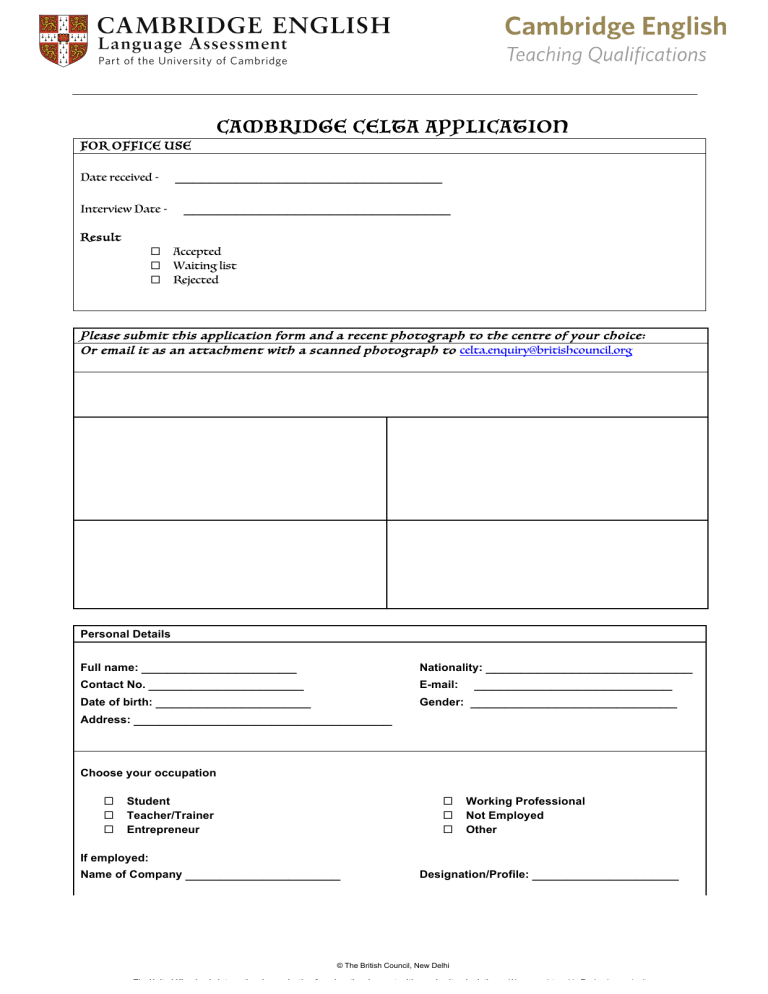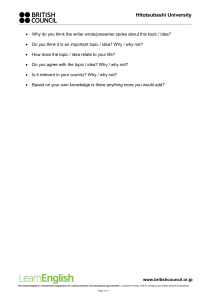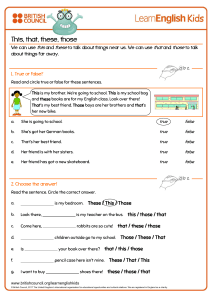
CAMBRIDGE CELTA APPLICATION FOR OFFICE USE Date received Interview Date - _______________________________ _______________________________ Result ¨ ¨ ¨ Accepted Waiting list Rejected Please submit this application form and a recent photograph to the centre of your choice: Or email it as an attachment with a scanned photograph to celta.enquiry@britishcouncil.org Personal Details Full name: __________________ Nationality: ________________________ Contact No. __________________ E-mail: Date of birth: __________________ Gender: _______________________ ________________________ Address: ______________________________ Choose your occupation ¨ ¨ ¨ Student Teacher/Trainer Entrepreneur ¨ ¨ ¨ Working Professional Not Employed Other If employed: Name of Company __________________ Designation/Profile: _________________ © The British Council, New Delhi The United Kingdom’s international organisation for educational opportunities and cultural relations. We are registered in England as a charity. Please indicate your preference ¨ Full time online course (5 weeks) ¨ ¨ ¨ Part time course (10 weeks) Full time Face to Face (Chennai) Full time Face to Face (Delhi) Health Declaration Do you have any medical condition that we should be aware of? If so, please state briefly. NOTE: British Council is committed to providing equality of opportunity for students. Cambridge CELTA is an intensive course which requires applicants to be physically, medically and mentally fit to pursue the course. This is to ensure that all students can benefit from the course in a safe and conducive environment. This information will be treated in confidence. How did you hear about us? ¨ British Council Website ¨ Emailers ¨ Radio Television Outdoor ¨ SMS ¨ Friends and Family ¨ ¨ Magazines Social Media Newspaper Other, Please Specify ¨ ¨ ¨ ¨ Consent Form British Council will use the information that you are providing in connection with administration of this workshop/event/outreach. The legal basis for processing your information is agreement with our terms and conditions of the registration. British Council would like to use the information you provide to send details of activities, services and events (including social events) which we think are of interest. To choose your contact preferences, please check any of the boxes below ¨ ¨ ¨ Email SMS Telephone You may unsubscribe by giving us missed call on 9222273596/ 9222273595 or write to us at India.North@britishcouncil.org. You may also unsubscribe to our e-mails by clicking the unsubscribe button/link. British Council complies with data protection law in the UK and laws in other countries that meet internationally accepted standards. You have the right to ask for a copy of the information we hold of you, and the right to ask us to correct any inaccuracies in the information provided by you. If you have concerns about how we have used your personal information, you have the right to complain to a privacy regulator. For detailed information, please refer to the privacy section of our website, www.britishcouncil.org/privacy or contact your local British Council office. We will keep your information for a period of seven years from the time of collection of your personal information. © The British Council, New Delhi The United Kingdom’s international organisation for educational opportunities and cultural relations. We are registered in England as a charity. __________________ Signature Date _________________ Academic and Professional Qualifications First language: ____________________________________ Other languages spoken: (Please list and evaluate your level using beginner/Pre-Intermediate/ Intermediate/Advanced) _____________________________________________ Academic & Professional qualifications: (please include dates & institutions in reverse order – attach a separate sheet if necessary) English language teaching experience: (if applicable) Other Work Experience References: (Please include a professional and a personal reference). Give the name, contact details, and their relationship to you. Reference 1 Reference 2 © The British Council, New Delhi The United Kingdom’s international organisation for educational opportunities and cultural relations. We are registered in England as a charity. Written Tasks 1. Please describe one good learning experience and one negative learning experience that you have had. Please write at least 150 words and use full sentences and paragraphs. 2. Please explain why you would like to take the CELTA course? Please write at least 150 words and use full sentences and paragraphs. © The British Council, New Delhi The United Kingdom’s international organisation for educational opportunities and cultural relations. We are registered in England as a charity. The CELTA course requires candidates to have an adequate level of English, ability to research language items and an aptitude for teaching. These tasks are designed to help you think about the English language and how it works. To complete these tasks, you are encouraged to refer to grammar reference books, such as: • Practical English Usage, by Michael Swan (Oxford 2006, 2013) • Grammar for English Language Teachers, by Martin Parrott (Cambridge 2010) LANGUAGE TASKS A. Grammar Look at the incorrect sentences below and: a) correct the verb; b) name the tense; c) comment briefly on the use of the correct tense. example: I had learned to play chess in school.. Correction: Tense: Use: 1. I learned to play chess in school. Simple past An action completed in the past He is checking the door every day before going to bed. a) _____________________________________________ b) _____________________________________________ © The British Council, New Delhi The United Kingdom’s international organisation for educational opportunities and cultural relations. We are registered in England as a charity. c) 2. 3. B. _____________________________________________ I have been to London 2 years ago. a) _____________________________________________ b) _____________________________________________ c) _____________________________________________ By the time he is seventy, he will visited many countries. a) _____________________________________________ b) _____________________________________________ c) _____________________________________________ Meaning How would you explain to a learner of English, the difference in meaning between the following sets of sentences? example: A. He’s been to Portugal. B. He’s gone to Portugal. Explanation A Explanation B Means ‘that he visited Portugal sometime in the past and only the experience is important now B: Means ‘he went to Portugal in the past and is still there at the present moment’. Questions 1. A B Explanation A Explanation B He stopped to call her back. He stopped calling her back. ____________________________________ ____________________________________ © The British Council, New Delhi The United Kingdom’s international organisation for educational opportunities and cultural relations. We are registered in England as a charity. 2. A B If they work hard, they’ll pass the exam. Explanation A ____________________________________ ____________________________________ Explanation B 3. A B Explanation A Explanation B C. If they worked hard, they’d pass the exam. She needn’t have completed all the work. She didn’t have to complete all the work. ____________________________________ ____________________________________ Functions 1. Look at the following sentences and decide what function is being used in each case. The first one has been done for you. Sentence Function We are going for a walk. Why don’t you come along too? invitation He lost his job? What a shame! You could have fed the cat. I must stop eating junk food. Could you possibly do this on your way back? Let’s go for a walk. © The British Council, New Delhi The United Kingdom’s international organisation for educational opportunities and cultural relations. We are registered in England as a charity. How annoying! We are sorry about the delay in processing your claim. Please wear your seatbelts and switch off your phones. 2. What other functions can you think of that haven’t been expressed by the sentences above? Write them in the table in the spaces provided. Sentence Function 3. a. Consider this request: Can you help me with this project? Give examples of four other ways we could make this request. Write down two increasingly formal ways of making the same request and two less formal ways. 1. _____________________________________________ 2. _____________________________________________ 3. _____________________________________________ 4. _____________________________________________ © The British Council, New Delhi The United Kingdom’s international organisation for educational opportunities and cultural relations. We are registered in England as a charity. D. 2. b. What factors are important in deciding which of these forms should be used? 3. c. Which exponent of request would you choose to teach to a beginner class? Why? Vocabulary When we look up a word in the dictionary, we find its literal (denotative) meaning and suggestive (connotative) meaning. Depending on our associations, emotions and experiences, certain words can have a positive, negative, or neutral connotation. Explain in simple terms, the difference in meaning between the following sets of words: example: childish/youthful © The British Council, New Delhi The United Kingdom’s international organisation for educational opportunities and cultural relations. We are registered in England as a charity. ‘childish’ has a negative connotation and refers to someone behaving in an immature way. ‘youthful’ has a positive connotation and refers to someone who seems young, lively and energetic. Explanation 1 Explanation 2 aggressive/assertive Aggressive _____________________________________________ Assertive _____________________________________________ win/beat Win _____________________________________________ Explanation Beat _____________________________________________ 3 Explanation gourmet/glutton Gourmet _____________________________________________ Glutton E. _____________________________________________ Phonology Indicate the number of syllables and the main stress in the following words, using: a. stressed syllable © The British Council, New Delhi The United Kingdom’s international organisation for educational opportunities and cultural relations. We are registered in England as a charity. b. O unstressed syllable ability o example: oo furniture o o Questions 1. procrastination _____________________________________________ 2. chairperson _____________________________________________ 3. probably _____________________________________________ 4. (a) project _____________________________________________ 5. (to) project _____________________________________________ 6. sentence _____________________________________________ 7. insurance _____________________________________________ 8. disintegrate _____________________________________________ 9. impossible _____________________________________________ WRITING TASKS - APPROACHES TO TEACHING AND LEARNING Please check your spelling and grammatical accuracy carefully after you have completed this section. © The British Council, New Delhi The United Kingdom’s international organisation for educational opportunities and cultural relations. We are registered in England as a charity. 1. Think about your experience(s) in learning a foreign language. What do you think makes an effective language lesson? Please write at least 150 words and use full sentences and paragraphs. 2. The CELTA course requires a lot of teamwork. For example, you are required to work together on lesson planning as well as give and receive feedback following teaching practice sessions. Imagine that a sensitive colleague has delivered a weak lesson. How would you present feedback, keeping in mind the need to learn, as well as your colleague’s feelings? Please write at least 150 words and use full sentences and paragraphs. © The British Council, New Delhi The United Kingdom’s international organisation for educational opportunities and cultural relations. We are registered in England as a charity. 3. In some cultures, students are expected to speak only when spoken to by the teacher and to interact only with the teacher. Do you think this is good practice? Justify your answer. Please write at least 150 words and use full sentences and paragraphs. © The British Council, New Delhi The United Kingdom’s international organisation for educational opportunities and cultural relations. We are registered in England as a charity. © The British Council, New Delhi The United Kingdom’s international organisation for educational opportunities and cultural relations. We are registered in England as a charity.

